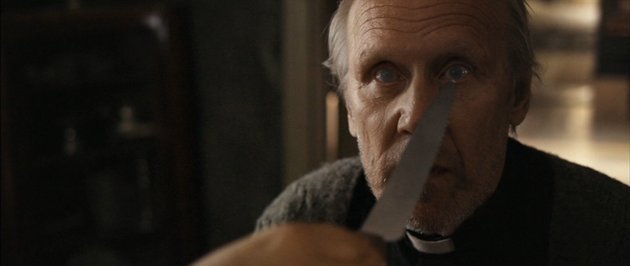[easyazon_image align=”left” height=”160″ identifier=”B00ZPH4RQ6″ locale=”US” src=”http://disabilitymovies.com/wp-content/uploads/2015/10/51DPTQyAHOL.SL160.jpg” tag=”disabilitymovies-20″ width=”115″][easyazon_link identifier=”B00ZPH4RQ6″ locale=”US” tag=”disabilitymovies-20″]Where Hope Grows[/easyazon_link] is meant to be an inspirational religious story about the unlikely friendship between a young man with Down Syndrome and Calvin, an alcoholic ex-baseball player with an anxiety disorder, but suffers from a hamhanded one-dimensional portrayal of people with Down Syndrome as a result.
The young man, nicknamed Produce after the department of the grocery store he works in, is never given a real name in the story. Presumably he is rightfully proud of his job and the spiffy apron and nametag that come with it, but it would be considered socially unacceptable to refer to a non-disabled adult by his job description outside of work. (It would also be unacceptable to smash up perfectly good fruits and vegetables in the back lot behind the grocery store where you work, but no one stops Calvin and Produce from doing just that.)
Details about Produce’s life are sparse as well; we eventually learn that his mother has died, but not whether he lives alone, with remaining family, or in a group home. Produce’s entire function in the story is to provide inspiration and guidance for Calvin, both in the form of his reliance on his “book” (the Bible, of course), and his unshakable happiness. Calvin even explicitly refers to Produce as a “magical kid”, voicing a common stereotype about people with Down Syndrome being supernaturally happy all the time.
But even what might be considered a positive stereotype about disability can be harmful, as it creates unrealistic expectations and devalues individuality. The fact is, not all people with Down Syndrome are relentlessly happy, and not all want to be hugged. (Some don’t like to be touched at all.) People with Down Syndrome are capable of experiencing the full range of emotional responses, and often suffer from depression. (One wonders how many people with Down Syndrome have had trouble getting treatment for it, if the stereotype about them is that they’re incapable of being depressed in the first place.)
One good thing about Where Hope Grows, though; they cast David DeSanctis, an actor with Down Syndrome and one of the first to play a leading role in a full-length English language feature film. DeSanctis ably demonstrated that people with intellectual disabilities can carry a major role, better than any non-disabled actor trying to ape disability. We look forward to seeing more disabled actors in general, and DeSanctis in particular, in the future.


